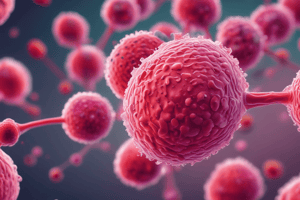Podcast
Questions and Answers
When should all recommended therapies be given to symptomatic patients?
When should all recommended therapies be given to symptomatic patients?
- Before 48 hours of testing
- After 24 hours of testing
- Only if all symptoms are severe
- At the time of testing (correct)
How often should the recommended therapies be administered to symptomatic patients?
How often should the recommended therapies be administered to symptomatic patients?
- Every hour for 12 hours
- Twice a day for 5 days
- In multiple doses over a week
- As a single dose (correct)
What is the ideal timing for administering therapies to symptomatic patients?
What is the ideal timing for administering therapies to symptomatic patients?
- After 48 hours of testing
- Before any symptoms appear
- Randomly throughout the day
- At the time of testing (correct)
Which group of patients should receive the recommended therapies based on the text?
Which group of patients should receive the recommended therapies based on the text?
What is the rationale behind giving all recommended therapies as a single dose?
What is the rationale behind giving all recommended therapies as a single dose?
What would be the consequence of delaying the administration of recommended therapies to symptomatic patients?
What would be the consequence of delaying the administration of recommended therapies to symptomatic patients?
What type of specimen should be collected from men for laboratory diagnosis of gonorrhea?
What type of specimen should be collected from men for laboratory diagnosis of gonorrhea?
Which finding in a smear of urethral exudate indicates a diagnosis of gonococcal infection in males?
Which finding in a smear of urethral exudate indicates a diagnosis of gonococcal infection in males?
Which type of swab should be used for collecting specimens in women for laboratory diagnosis?
Which type of swab should be used for collecting specimens in women for laboratory diagnosis?
What is the main pathogen responsible for gonorrhea?
What is the main pathogen responsible for gonorrhea?
Which of the following does NOT cause bacterial STIs?
Which of the following does NOT cause bacterial STIs?
Flashcards are hidden until you start studying




